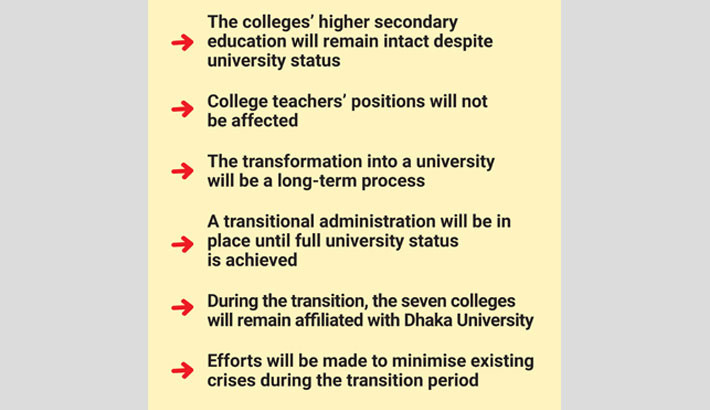
Following years of student protests and administrative challenges stemming from a 2017 affiliation with Dhaka University, the interim government has initiated plans to transform seven government colleges in Dhaka into a new university, with a special expert committee now assessing how to best preserve the institutions’ heritage and manage the complex transition, including the consideration of a “hybrid model”.
According to sources within the committee, significant progress has been made toward the university's formation. However, the exact structure of the institution is still under discussion.
The committee has so far held meetings with 12 stakeholders to gather opinions. All parties have agreed on maintaining the heritage of these colleges.
However, transitioning to a university requires a long-term process, and students have been assured accordingly. Before achieving full university status, a transitional phase will be implemented, including a transitional administration.
During this period, the seven colleges will remain affiliated with the University of Dhaka. A designated authority will be required to issue certificates to students during this transition, with the Dhaka University continuing to serve this role until at least 2031.
This indicates a long timeframe, although full university status may be achieved sooner.
The committee further stated that multiple issues must be resolved before the colleges can be transformed into a university. It will not be an overnight process.
Five out of the seven colleges currently offer intermediate (higher secondary) education, which has a prestigious legacy. Thus, the intermediate level must not be disrupted.
If necessary, intermediate education may also be introduced in colleges that do not currently offer it. This will ensure that the positions of 1,400 teachers across the seven institutions remain intact.
Additionally, provisions must be made for female students at Eden Mohila College.
To address these concerns, a hybrid model will be followed to maintain overall stability.
The committee is also gathering suggestions from stakeholders regarding the university's name. Proposals include “Dhaka Metropolitan University” and “July 36 University”, among others, but a final name has not yet been determined.
Following continuous student protests, the Ministry of Education formed a special expert committee on 30 December to integrate the seven colleges into a university framework. The committee, led by University Grants Commission (UGC) Chairman Prof SMA Faiz, comprises four members: an additional secretary from the Secondary and Higher Education Division, the Dhaka University Pro-Vice-Chancellor (Education) Prof Mamun Ahmed, and UGC Member Prof Tanzimuddin Khan. Later, UGC Member Prof Saidur Rahman was co-opted into the committee.
The committee has been given four months to complete its work but is striving to submit its report ahead of schedule.
On 17 February 2017, under the directive of then-prime minister Sheikh Hasina, the seven colleges were affiliated with Dhaka University. This affiliation was marked by conflicts between Dhaka University and National University.
The seven affiliated colleges include Dhaka College, Eden Mohila College, Government Shaheed Suhrawardy College, Kabi Nazrul Government College, Begum Badrunnesa Government Women’s College, Government Bangla College, and Government Titumir College.
Without prior planning and preparation, Dhaka University struggled to manage nearly 2,00,000 students enrolled in these seven institutions at the outset of the affiliation. Additionally, the National University delayed providing essential information on ongoing students, exacerbating the crisis. Despite initial challenges being addressed, tensions remained between Dhaka University and the seven colleges over affiliation.
Debates arose over whether students should be identified under Dhaka University, the issuance of independent certificates, removal of the “affiliated” designation, and use of transportation services, among other issues. Over the past eight years, students from both sides protested at various times, demanding the cancellation of affiliation.
The movement gained further momentum after the Awami League government was ousted on 5 August 2024. This led to violent clashes between students of both institutions.
Following the events, on 27 January this year, Dhaka University Vice-Chancellor Prof Niaz Ahmed Khan officially announced the separation of the seven colleges from the university.
This prompted the committee to accelerate its work, and after consulting all parties, they have drafted a detailed proposal outlining the operational framework for the seven colleges during the transition period. This proposal has already been submitted to the Ministry of Education.
Regarding the progress, expert committee Chairman Prof SMA Faiz told the Daily Sun, “Until the new university is fully operational, the UGC will remain involved. We are working with great diligence and consideration for students' demands. We hope to reach a positive resolution.”
UGC Member Prof Tanzimuddin Khan added, “We are working to preserve the heritage of the seven colleges. Their intermediate education has a strong reputation, which we aim to maintain. However, transitioning into a university is a long process and cannot be done abruptly. Challenges will arise, but we are considering a hybrid model. We will soon reach a satisfactory solution. During the transition, we will ensure a smooth process while addressing students’ concerns.”
Prof Md Saidur Rahman stated, “The crisis surrounding the seven colleges is multifaceted. Their intermediate education is highly esteemed, and no existing university model accommodates their management. We must preserve their academic reputation. Our goal is to maintain the colleges' prestige while finding a sustainable solution.”


